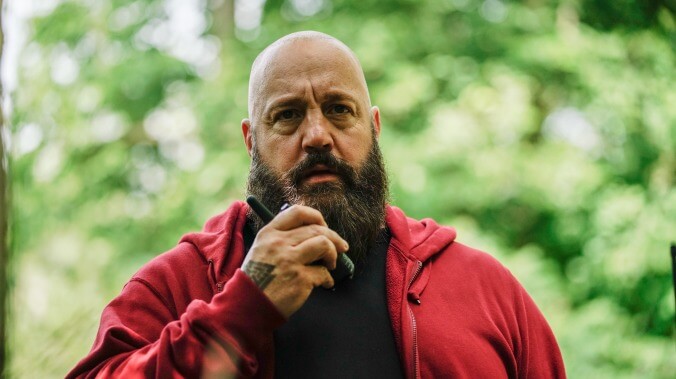Kevin James playing a “scary” Nazi villain isn’t even the most ridiculous thing about Becky


Imagine that the beloved family film Home Alone landed a hard-R instead of a PG, because little Kevin McCallister’s scampish booby-trapping drew geysers of blood. Now imagine that the bad guys he downed with nails and fire weren’t bumbling burglars but ruthless neo-Nazis, but also that the baddest of the bunch was portrayed by a prime-time comedian with a swastika branded onto the back of his noggin. Finally, imagine that all of this was played completely straight, its laughs almost entirely unintentional. Such a hypothetical project would look a lot like Becky, a new home-invasion thriller that’s as preposterous as it is gleefully “extreme.” Eyeballs get popped out of sockets, brutish white supremacists growl about racial purity, and the body count includes cute dogs and cute kids alike. Yet none of that can quite disguise the essential goofiness of the premise, in which an angry tween goes ham on a bunch of supposedly hardened criminals. And oh yes, their leader is Kevin James.
Securing the King Of Queens to play a hulking skinhead counts as Becky’s biggest hook. James replaced the filmmakers’ first choice, Simon Pegg, suggesting that the plan was always to give a funnyman his chance to glower and threaten. This kind of casting against type can be effective; think of Patrick Stewart, subverting his regal dignity to play a Nazi kingpin in Green Room (a film roughly 20 times as intense and visceral as this one), or of Albert Brooks proving his range as the decidedly non-humorous, razor-wielding crime boss of Drive. James, skull bare and face swallowed in beard, looks menacing enough. But the character, an escaped convict named Dominick, is one of those bad guys who likes to delay his violent outbursts with calm monologues (at one point while roasting marshmallows), and this actor just lacks the necessary presence to make that scary. The performance only works if you take it as a general burn on racist idiots, akin to Spike Lee casting Topher Grace as David Duke.
Is James a big Die Hard fan? He’s now officially occupied both sides of the Nakatomi Plaza struggle, having twice parodied a Bruce Willis everycop in the Paul Blart films. There’s an element of slapstick to the abuse he suffers in Becky, too. The John McClane to his Hans Gruber is the title character (Lulu Wilson, trading the angry spirits she usually faces for a different kind of white-sheeted foe), a 13-year-old seething with grief and rage over the death of her mother a year earlier. Becky’s father (Joel McHale) has a new girlfriend (Amanda Brugel) with a young son (Isaiah Rockcliffe), and like the dunderheaded dad of The Lodge, he hopes a weekend at the family cabin will help ease tensions. He, too, is played by a moonlighting sitcom star—and the character’s even named Jeff, raising the intriguing possibility that this is all some daydream playing out in the head of dyed-in-the-wool Die Hard fanatic Abed.
There’s certainly comic potential in a pissed-off middle-schooler barking threats into a walkie talkie while visiting violent screwball retribution upon incompetent Nazis, who mount a jailbreak in the film’s opening scenes and come searching for a vaguely significant item that may be stashed on the property. But Becky doesn’t have much of a sense of humor, nor the good sense to play with the dramatic tension of an angsty kid forced to rescue people she resents. And though the villains are white-power scumbags, and Becky’s potential new step-relatives are Black, it would be a major stretch to call the film topical—the hate-monger angle could be completely scrapped and it wouldn’t much change the trajectory of the plot. That comes as a bit of a surprise, given that the film is directed by Jonathan Milott and Cary Murnion, whose last midnight movie, Bushwick, imagined Brooklyn engulfed by a new civil war. There, the two orchestrated the action in elaborate single takes. Becky relies more on sharp editing, like the match-cutting between the good guys and bad guys cruising down the highway, or an energetically staged scene that uses pans to close the distance between Becky and Dominick, exchanging loaded words over the radio from their separate positions in the woods.
Becky is not without its grisly low-brow pleasures. But nothing in the movie makes a damn lick of sense—not its heroine’s instant transformation into a killing machine, not the notion that James’ blundering scoundrel could inspire a loyal posse, not the shifting allegiances of a giant, lumbering henchman (Robert Maillet) suffering an unconvincing crisis of conscience. Hell, the film can’t even be bothered to explain its MacGuffin, the Valknut-branded key that draws Dominick and his gang to the premises. Is it supernatural? Do the heavies just believe it’s supernatural? What’s it doing at this particular lake house? The movie literally never says, which is pretty indicative of its general indifference to the plot mechanics fueling the gory mayhem. On that last front, it sporadically delivers, at least for those who might get a flush of joy out of seeing a Nazi get sliced and diced for his sins. But as with just about everything in this bloody but dopey B-movie, Green Room did it better.